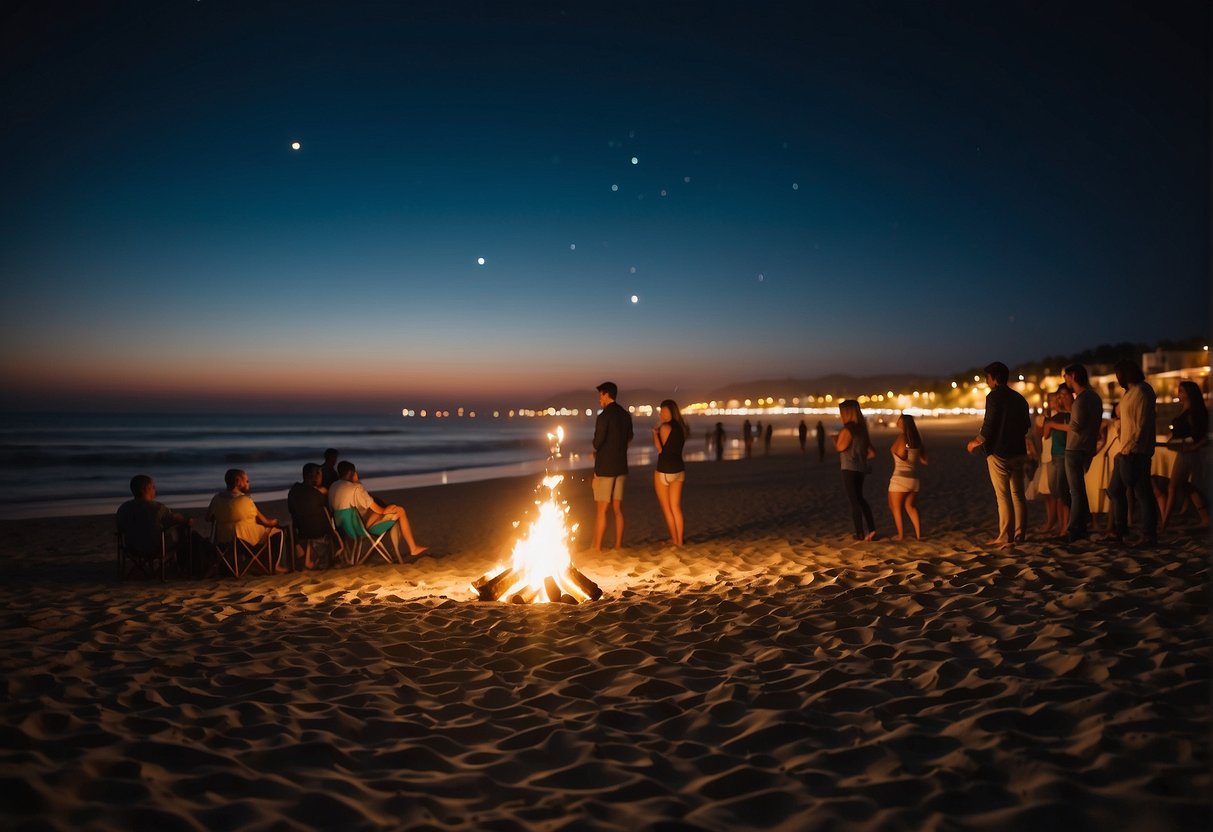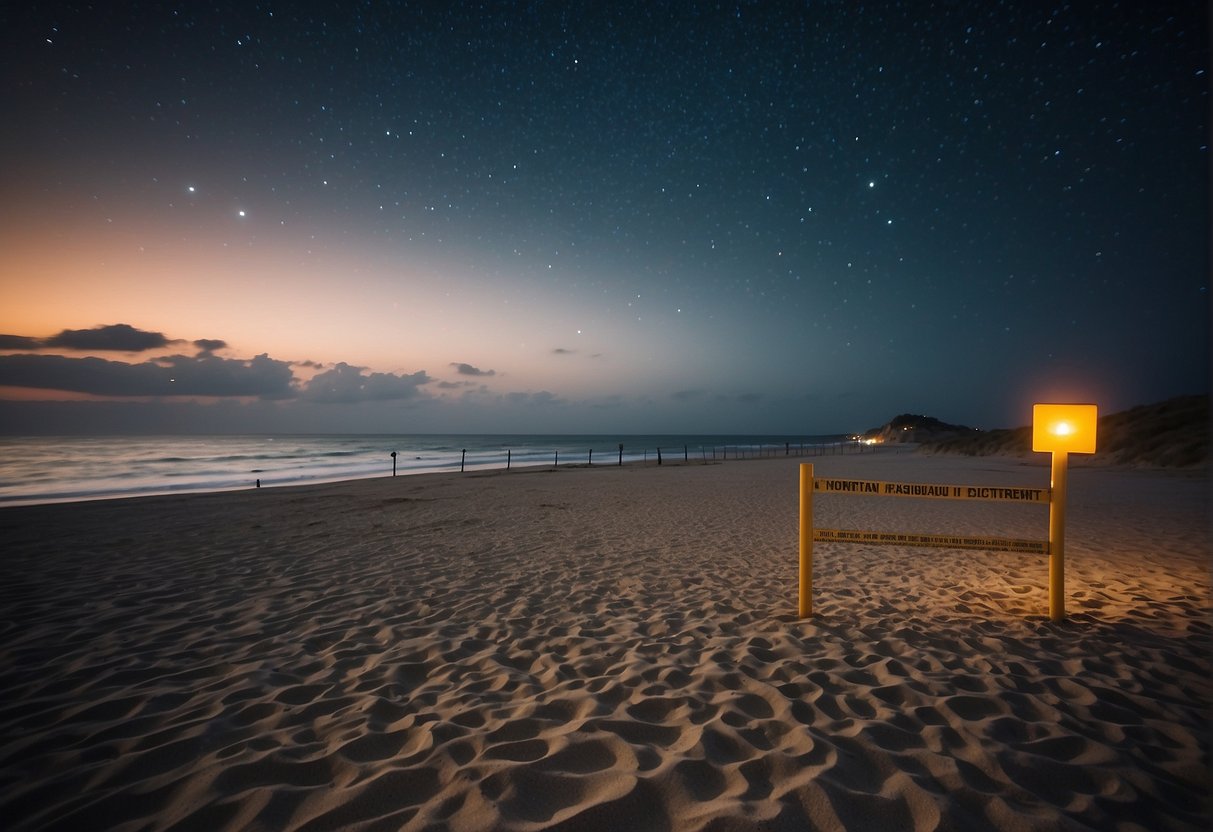Beach Closure Policies
When it comes to beach closure policies, there are a few things to keep in mind.
Legal restrictions and curfews are some of the most common reasons why a beach may be closed at night.
Safety and security measures also play a role in determining whether a beach is open or closed after dark.
Legal Restrictions and Curfews
In some areas, it may be illegal to go to the beach at night.
For example, in California, state parks often close at sunset, and it is illegal to be on the beach after dark.
However, some beaches, such as Santa Monica Beach and Redondo Beach, remain open 24 hours a day.
It is important to check with local authorities or research online beforehand to know the accessibility of a specific beach at night.
Local guidelines and curfews can also affect beach regulations.
Some cities may impose curfews on beaches to prevent criminal activity.
For example, in Florida, some beaches have implemented curfews to combat criminal activity after dark.
Police departments may also impose closure hours to help keep the beach safe and secure.
Safety and Security Measures
Beach closures can also be due to safety and security measures.
In some cases, beaches may be closed due to weather conditions or water quality issues.
For example, excessive rainwater can carry pollution from storm drains to recreational waters, leading to beach closures and advisories.
Harmful algal blooms and sewage and chemical spills can also lead to beach closures.
In addition to natural causes, criminal activity can also lead to beach closures.
Police departments may close beaches due to criminal activity or the risk of criminal activity.
It is important to follow all local guidelines and regulations to help keep the beach safe and secure for everyone.
Beach Amenities and Activities After Dark

When the sun sets, the fun doesn’t have to stop at the beach.
Many public beaches in California and Florida remain open at night, allowing visitors to enjoy a variety of activities and amenities.
Here are some popular options for beachgoers looking to extend their fun beyond daylight hours.
Night-time Beach Events
Some beaches offer special events after dark, such as bonfires, concerts, and outdoor movie screenings.
These events are often free and open to the public but may require advance registration or a small fee.
Visitors can check the local events calendar or contact the city or county parks department for more information.
Regulated Activities and Permits
While many beaches allow visitors to swim, walk, and relax on the sand after dark, some activities may be regulated or require permits.
For example, driving on the beach at night, sleeping on the beach, and holding large gatherings may be prohibited or require special permits.
Visitors should check with local authorities or the beach’s website for rules and regulations.
Beach amenities such as lifeguards, parking, and picnic tables may also have restricted hours or limited availability after dark.
Visitors should plan accordingly and be aware of their surroundings, especially if swimming at night.
Walking on the beach or taking a moonlit stroll can be a romantic and peaceful experience, but visitors should exercise caution and stay in well-lit areas.
Natural Hazards and Environmental Considerations

Wildlife and Environmental Risks
When visiting public beaches, it is important to be aware of the potential risks posed by local wildlife and environmental hazards.
For example, jellyfish stings can be a common issue in some areas, and sharp rocks or glass containers left on the beach can pose a danger to beachgoers.
Additionally, loitering or parking in restricted areas can result in fines or other penalties.
To mitigate these risks, beach authorities often impose restrictions and regulations on beachgoers.
These can include rules about where to swim, what to bring to the beach, and how to dispose of waste.
It is important to follow these rules to ensure the safety of both humans and wildlife.
Beach Conservation Efforts
In addition to safety concerns, it is important to consider the impact of human activity on the beach environment.
Beach conservation efforts aim to preserve the natural beauty and diversity of the beach ecosystem while still allowing for public access.
One way that beach authorities can protect the environment is by closing beaches at night.
This can help prevent damage to sensitive habitats and reduce the risk of littering and pollution.
Additionally, beach authorities may place restrictions on certain activities, such as fires or camping, to prevent damage to the beach environment.
Frequently Asked Questions About Beach Operations
What are the typical closing hours for beaches?
Most beaches close at night, but the specific closing hours vary depending on the location.
In general, beaches are open from early morning until evening and close around sunset.
However, some beaches may have extended hours during the summer months or for special events.
Visitors should always check with the local authorities or the beach’s website to confirm the closing time.
Are there any beaches open 24 hours in Florida?
Yes, some beaches in Florida are open 24 hours a day.
Beaches that are open 24 hours a day allow guests throughout the whole day and night.
However, visitors should always check with the local authorities or the beach’s website to confirm the hours of operation.
Is nighttime beach access legal in California?
In California, the law does not prohibit access to the beach at night.
However, some beaches may have specific rules and regulations regarding nighttime access.
Visitors should always check with the local authorities or the beach’s website to confirm the hours of operation.
Can you visit New Jersey beaches after dark?
In New Jersey, most beaches close at night.
Beach hours vary depending on the location, and visitors should always check with the local authorities or the beach’s website to confirm the hours of operation.
However, some beaches may have extended hours during the summer months or for special events.
Are there restrictions for walking on Florida beaches at night?
In Florida, there are no specific restrictions for walking on the beach at night.
However, visitors should always be mindful of their surroundings and take necessary precautions for their safety.
Some beaches may have specific rules and regulations regarding nighttime access, and visitors should always check with the local authorities or the beach’s website to confirm the hours of operation.
How late is Virginia Beach accessible to the public?
In Virginia Beach, most beaches close at night.
Beach hours vary depending on the location, and visitors should always check with the local authorities or the beach’s website to confirm the hours of operation.
However, some beaches may have extended hours during the summer months or for special events.